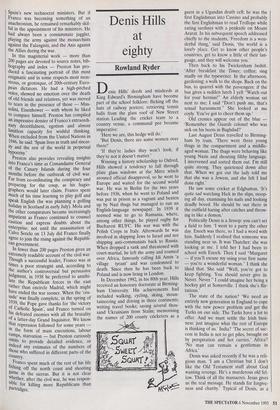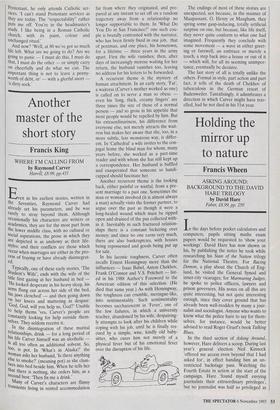Denis Hills at eighty
Rowland Ryder
Denis Hills' deeds and misdeeds at King Edward's Birmingham have become part of the school folklore: flicking off the hats of railway porters; retrieving tennis balls from the glass roof of New Street station. Leading the cricket team to a country venue, a communal pee became imperative:
'Here we are, this hedge will do.' 'But Denis, there are some women over there!'
'If they're ladies they won't look; if they're not it doesn't matter.' Winning a history scholarship to Oxford, Hills showed a tendency to fall through plate glass windows at the Mitre which aroused official disapproval, so he went to Europe and waited for the second world war. He was in Berlin for the two years before 1936, when he went to Poland and was put in prison as a vagrant and beaten up by Nazi thugs but managed to run an English-language newspaper. In 1939 it seemed wise to go to Rumania, where, among other things, he played rugby for Bucharest RUFC. His war was with the Polish Corps in Italy. Afterwards he was involved in shipping Jews to Israel and not shipping anti-communists back to Russia. When dropped a rank and threatened with court-martial, he left the army and roamed over Africa, famously calling Idi Amin 'a village tyrant' and was condemned to death. Since then he has been back to Poland and is now living in London. In December 1992, in his 80th year, Hills received an honorary doctorate at Birming- ham University. His achievements had included walking, cycling, skiing, moun- taineering and driving in three continents; writing travel books; saving several thou- sand Ukrainians from Stalin; memorising the names of 200 county cricketers as a guest in a Ugandan death cell; he was the first Englishman into Cassino and probably the first Englishman to read Trollope while eating sardines with a penknife on Mount Ararat. In his subsequent speech addressed chiefly to the students, 'Freedom is a won- derful thing,' said Denis, 'the world is a lovely place. Get to know other people's countries, get to know a little of their lan- guage, and they will welcome you.'
Then back to his Twickenham bedsit. 'After breakfast the Times; coffee; sing madly on the typewriter. In the afternoon, gardening; a walk to the shops. Back on the bus, to quarrel with the passengers: if the bus gives a sudden lurch I yell "Watch out for your hernias!" An elderly woman sat next to me; I said "Don't push me, that's sexual harassment." She looked at me coyly. You've got to cheer them up.'
Old cronies appear out of the blue — 'Remember the Guards colonel who was sick on his boots in Baghdad?'
Last August Denis travelled to Birming- ham by train. 'There were three young thugs in the compartment and a middle- aged woman. The thugs were behaving like young Nazis and shouting filthy language. I intervened and sorted them out. I'm still quite strong. They quietened down after that. When we got out the lady told me that she was a Jewess, and she felt I had done right.'
He saw some cricket at Edgbaston. 'It's quite sad watching Hick in the slips, stoop- ing all day, examining his nails and looking deadly bored. He should be out there in the outfield haring after catches and throw- ing in like a demon.'
Politically Denis is a Jessop: you can't set a field to him. 'I went to a party the other day. Enoch was there, so I had a word with him. Suddenly I realised that someone was standing near us. It was Thatcher: she was looking at me. I told her I had been to school with Enoch. Then I said "Margaret — if you'll excuse my using your first name — you're a wonderful woman." I think she liked that. She said "Well, you've got to keep fighting. You should never give in. Never. Never." I could imagine her being a hockey girl at Somerville. I think she's flir- tatious.'
The state of the nation? 'We need an entirely new generation in England to cope with the new power problem and get the Turks on our side. The Turks have a lot to offer. And we must settle the Irish busi- ness: just imagine what the rest of Europe is thinking of us.' India? 'The secret of suc- cess in India is not to get piles, brought on by perspiration and hot curries.' Africa? 'No man can remain a gentleman in Africa.'
Denis was asked recently if he was a reli- gious man. 'I am a Christian but I don't like the Old Testament stuff about God wanting revenge. He's a murderous old fel- low. Think of all the massacres. Jesus gives us the real message. He stands for forgive- ness and charity.' Typical of Denis, as a Protestant, he only attends Catholic ser- vices. 'I can't stand Protestant services as they are today. The "respectability" rather puts me off. You're in the headmaster's study. I like being in a Roman Catholic church, with its paint, colour and unchanged ritual.'
And now? 'Well, at 80 we've got so much life left. What are we going to do? Are we going to panic — I must do this, I must do that, I must do the other — or simply carry on cheerfully and do what we can. The important thing is not to leave a penny- worth of debt, or' — with a gleeful snort — a dirty sock.'











































































 Previous page
Previous page